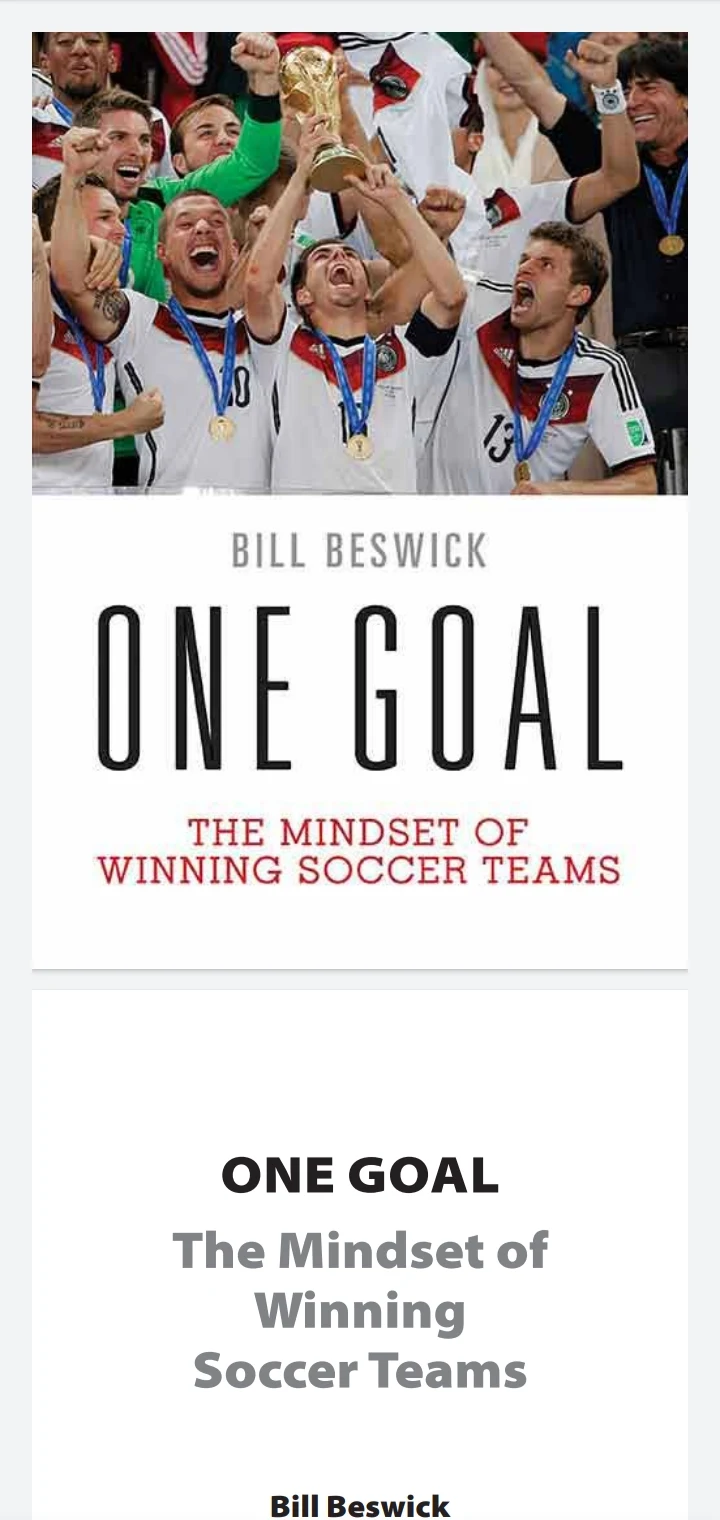ONE GOAL The Mindset of Winning Soccer Teams PDF
This book reflects my long experience with teams at grassroots, professional and international levels. Its purpose is to share a key lesson learned: that teams win not only because they have superior talent but also because they have a superior mindset.
Team mindset—the way that a team collectively think and feel in any given situation—is a powerful weapon that governs winning behaviour when positive, focused and strong.
Many teams with lesser talent have won because of the strength of their attitude.
Likewise, talented teams with weaker mindsets are always vulnerable to shock defeats.
Of course, great talent plus great mindset is an unbeatable combination.
My role is to help coaches build a winning mindset in their team.
In the competitive world of soccer, this is an everyday challenge.
Team mindset is always under pressure from a wide range of negative influences.
Coaches may find themselves injecting confidence when their team are anxious and adding a measure of anxiety when their team are too confident.
This need to build a positive team mindset applies to all coaches and all teams regardless of age, gender or level of competition.
Teams can only maximise on their talent if they have a mindset fully committed to the hard work of preparing to win.
Winning teams are characterised by their passion to practice and learn and their toughness to persist regardless of circumstances.
This book is written in the language of coaches and players, and it is intended to stimulate and help readers.
It is organised into three sections that build upon each other in sequence.
With a concept like mindset, however, many of the issues described throughout the book are interrelated, so I have deliberately reinforced some important points from chapter to chapter.
Some readers will want to dip into the chapters that strike them as particularly relevant; others will enjoy a cover-to-cover read
Part I, ‘Direction’ (chapters 1 through 4), lays the foundation for a team mindset built on unity of purpose and direction.
In these four initial chapters the primary importance of getting everyone, both in and around the team, on the same page is emphasised, as are the benefits of creating a positive environment that encourages and supports a fighter mentality.
Examining the mental strength to deal with the challenges of competition and exploring the extra impetus provided by the right player leadership are covered in chapters 3 and 4.
Overall, part I gives readers a solid platform from which to develop greater understanding of how to develop a winning team mindset.
Part II, ‘Relationships’ (chapters 5 through 9), focuses on the power released when players are treated as human beings as they work on perfecting the tasks they undertake—their ‘human doings’.
The first of these five chapters looks at how building positive team relationships leads to the extra emotional power of a team playing for one another, not just with each other.
Modern soccer increasingly requires players who are intelligent and remain open to new learning experiences, covered in chapter 6, ‘Fostering Coachability’, and who are sufficiently mature to be held accountable for their play, the theme of chapter 7.
The value of merging individual abilities and attitudes into a synchronised team who can execute seamlessly is the subject of chapter 8.
Finally, chapter 9 opens discussion on the vital ever-present challenge for coaches—managing team mood through what is often a long, hard season. The final section, part III, ‘Performance’ (chapters 10 through 15), moves on to team mindset in action, covering ways in which mindset can be developed to minimise barriers to team play and assist in achieving winning performances.
Topics covered in these chapters include competing cohesively, understanding and influencing game momentum, in chapters 10 and 11, and dealing with the negative threats of pressure and adversity, in chapters 12 and 13, respectively.
Chapter 14 then examines the issue of keeping a team fresh and full of energy, despite the rigours of a long season, a key factor in end-of-season success when playoffs and decisive league positions loom!
Finally, even winning can bring its own mindset problems.
Chapter 15 looks at strategies that help coaches and players sustain excellence with continued success.
This whole, complex area of team mindset is one that coaches frequently question me about. Therefore, I have become more involved and interested in increasing my own knowledge and sharing relevant experience.
So although this book obviously draws examples mainly from soccer, each chapter is illustrated by a wide range of stories, quotations and references from other team sports and great coaches.
One universal characteristic of coaches who desire to improve themselves and their athletes is being open to learning, receiving new ideas and absorbing other experiences to assimilate into their own developing philosophies.
Therefore, I make no apologies for the wide range of references. Instead, I sincerely hope that aspiring coaches and athletes will find them stimulating and helpful in understanding how soccer excellence is created.
My hope is that this book will help coaches at all levels understand how mindset can be a weapon to win, what can create or destroy it and what they can do to nurture it.
The good news is that mindset is a choice.
This book provides many examples of players and teams who improve their performance from the moment they elect to change their mindset from negative to positive.
Coaches are a prime influence. Throughout this book they will find a range of practical strategies that they can apply to ensure that their team make choices that lead towards a winning mindset.
This process is not easy. Shaping mindsets individually and collectively takes dedication, concentration and repetition.
Development must take place alongside the training of physical skills because the two are interdependent.
The mindset of the team governs its readiness to perform, whereas physiological arousal governs the intensity of effort.
A team cannot perform the same amount of work or reach the same level of quality under a negative mindset compared with what they can achieve when positive.
The task of coaches reading this book is to interpret the messages, stories and illustrations that are pertinent to their situation and use them in a manner that relates specifically to their own team context.
To that end I encourage coaches to see themselves as a little more of a psychologist and a little less of a trainer.
I guarantee that they and their team will enjoy and benefit from the change.


Post a Comment